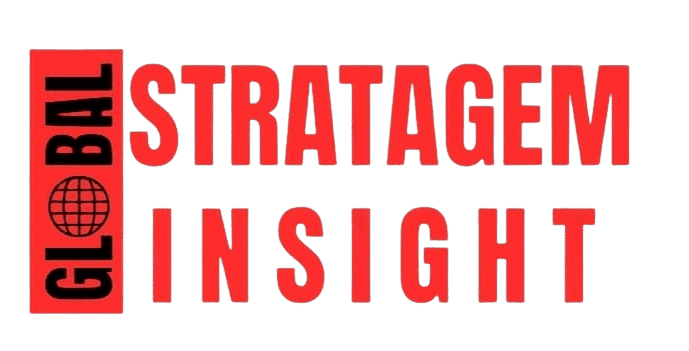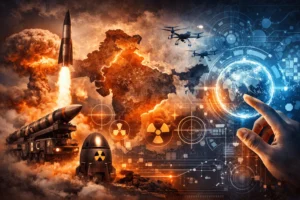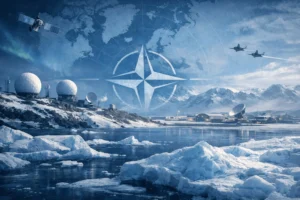Israel counter proliferation efforts against Iran: A threat to the global non- proliferation regime
The recent 12-day war between Iran and Israel has raised serious concerns about the global non-proliferation efforts to contain spread of nuclear weapons. In his book ‘Man, the state and War’, Kenneth Waltz defines the anarchic nature of international politics as a system “with many sovereign states with no system of law enforceable among them, which each state judging its ambitions and grievances according to the dictates of its own reason or desire-conflict sometimes leading to war, is bound to occur”.
The relevance of this notion is evident in today’s world where legitimacy of a number of international institutions and organization, once formed to overcome the anarchic nature of the world, is largely being questioned. The values these institutions hold are eroding as military power has triumphed the diplomatic efforts upholding these norms. The most recent example of this is the Israel’s counterproliferation efforts against Iran. This is not the first time counterproliferation efforts were used. Counterproliferation refers to the use of military force to prevent another state from acquiring nuclear weapons. This op-ed will analyze recent Iran-Israel conflict and how Israel’s unilateral military actions against Iran’s nuclear facilities are questioning global non-proliferation norms.
In May 2025 International Atomic Energy Agency (IAEA) published a report claiming that Iran has a stockpile of about 60% of Highly Enriched Uranium which is a violation of IAEA safeguards. IAEA has not even verified that Iran is on the path to nuclear weapons. In a unilateral move, Israel launched a military operation against Iranian nuclear sites killing Iranian top military commanders and nuclear scientists. Not only Israel but USA attacked on Isfahan, Fordow and Natanz facilities claiming dismantling Iranian nuclear capabilities successfully. But as the war ended, Iran has refused to cooperate with IAEA which has raised concerns for the International Community. Apart from the geopolitical implications, such counterproliferation efforts will have wide implications for the nuclear non-proliferation regime efforts in the Gulf region.
Nuclear Non-Proliferation Treaty (NPT) was formed to prevent the spread of nuclear weapons and extend cooperation for the peaceful uses of nuclear technology. Iran being a signatory to NPT has also IAEA inspections in line with the non-proliferation spirit. But arm attack from a non- signatory to the NPT on Iran has put a question mark on the efficacy of the nuclear non-proliferation regime.
In addition to this, some of the signatories to the NPT including Germany and the United States have supported nuclear counter proliferation efforts. This highlighted the politicization that exists within the nuclear non-proliferation regime. Despite the fact, states have submitted their trust in the international regime. It is inefficient in case of real politik. This notion fundamentally challenged the efficacy of the working of nuclear non-proliferation regime. Hence it augmented Keneth Waltz’s point that when laws become inefficient, every state will determine its action based on its own rationale.
Secondly, Israel armed attack on Iran was in violation of Article 2(4) of UN charter. Despite the violation of UN charter and failure of International Organization to take actions for the territorial integrity and sovereignty of Iran has put the country on self-help path. So, counter proliferation may exacerbate nuclearization efforts of Iran. The recent attack by Israel has challenged the territorial integrity of Iran. As security is the ultimate aim of states in international relations so, the Israeli attack has created a security dilemma for Iranian. The attack has reaffirmed the notion that acquisition of nuclear weapons is the only guarantee for territorial security and integrity of Iran.
Moreover, Iran has long maintained the policy of strategic ambiguity with respect to its nuclear weapons. Military strikes from Israel and United States have provide the rationale to hardliners in Iran, surpassing the moderators who were against acquiring nuclear weapons and achieve the political legitimacy on acquisition of nuclear weapons is indispensable to Iranian security and territorial integrity. Israel has demonstrated its aggressive and expansionist policies in the region. It has no regards for international law and international regimes. The West has shown its hypocrisy by providing protective cover to Israel illegal actions. So, countries like Iran have no other option than to pursue to nuclear weapons to maximize their security in the region.
Thirdly, the Middle Eastern region is already involved in bloc politics. On the one hand, there are Gulf monarchies having oil wealth and gained significant attention from the west. Most Gulf countries host military bases of United States to counter the Iranian threat. On the other side, there is Iran that has long resisted Western Influence. This orientation towards the West places Gulf countries and Iran at opposite poles. The road to acquisition of nuclear material, as evident from IAEA and recent suspension of Iranian cooperation with IAEA along with rumors of threat of exit form NPT may put the Gulf countries in a security dilemma.
In order to overcome this dilemma, there is a likely chance that the Gulf countries might go nuclear. Saudia Arabia is already in talks with United States related to nuclear energy for peaceful purposes. UAE has already four Korean nuclear reactors for energy purposes upon which the Qatar has raised objection. This shows that Israel counter proliferation efforts against Iran may have a spillover effect on the nuclearization of Gulf countries and thus leading to a failure of the nuclear non-proliferation regime.
In a nuclear world, things operate in grey zones where actions have wide repercussions. International institutions and regimes that were formed to bring peace in the world are increasingly challenged by the real politik of states. The use of force to prevent another state from acquiring nuclear weapons does not necessarily lead to submission of states. Israel counter proliferation efforts against Iran pose a setback to the efficacy of nuclear non-proliferation regime thereby accelerating nuclearization of Iran and region at large. Hence, counter proliferation efforts sometimes prove to be counterproductive.



